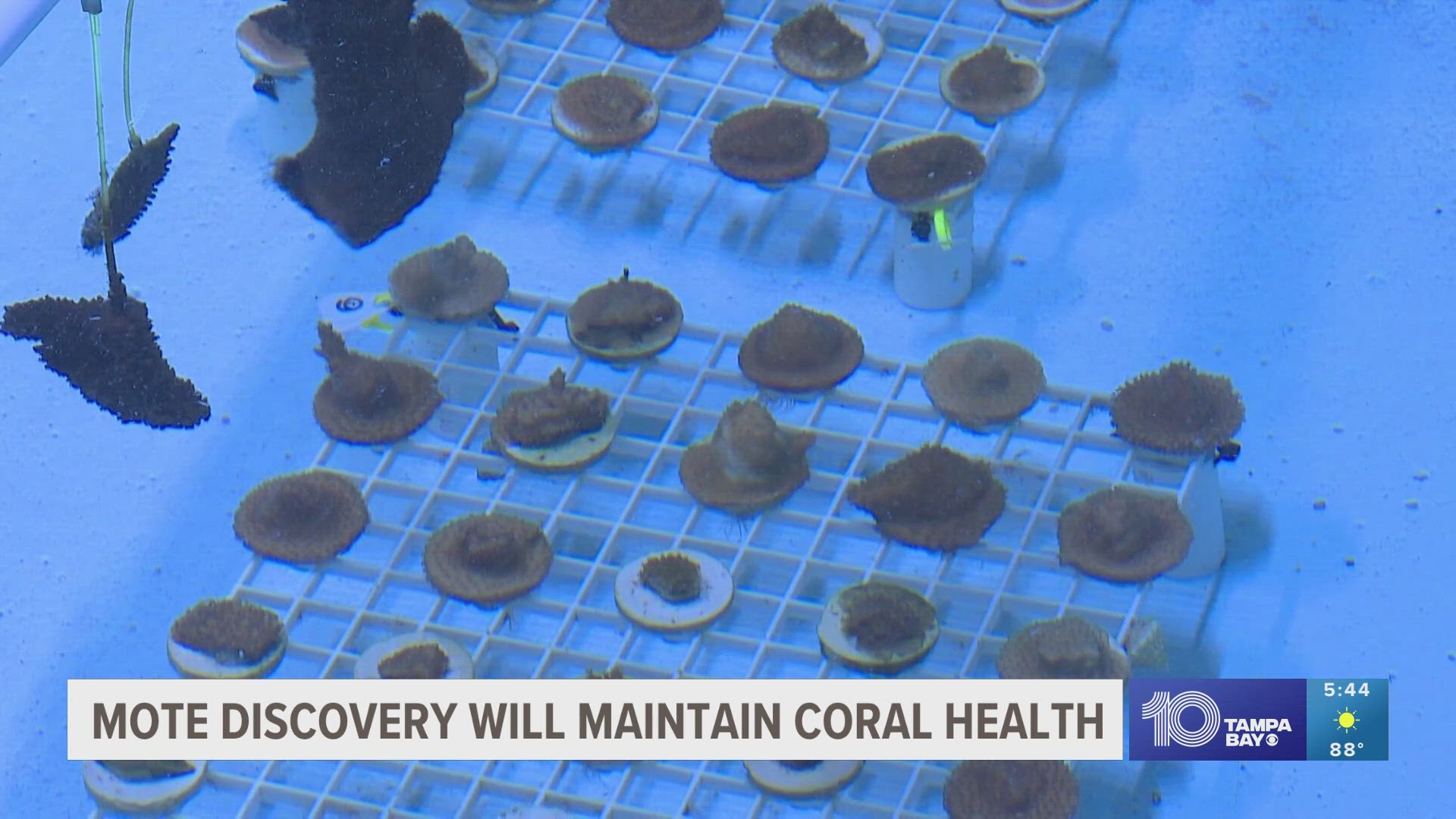SARASOTA, Fla. — Mote Marine Laboratory is celebrating the spawning of a species of coral that is difficult to breed in captivity.
Eusmilia fastigiata, which is commonly known as smooth flower coral, was brought to Mote in March 2022 as part of a project focusing on the rescue, housing and future propagation of Florida corals.
The corals received spawned and Mote's International Coral Gene Bank settled them. The gene bank, located in Sarasota, is a place where various species of coral are stored. It acts as a sanctuary for corals to help prevent the loss of species if they die in their natural environment, according to Mote. The bank is home to thousands of coral genotypes, which are genetic varieties, of at least 26 species.
The laboratory staff said the selective nature and specific conditions required for reproduction among the coral is a "notable challenge."
"The species’ highly selective nature and the specific conditions required for settlement result in particularly low success rates. This makes the Gene Bank’s recent feat all the more significant," a news release said.
Over the last two years, staff were able to raise the coral and facilitate the spawning of a second generation.
Smooth flower coral is highly susceptible to stony coral tissue loss, which is a rapid tissue loss that kills corals. The disease is contributing to the rapid loss of coral reefs, according to the National Oceanic and Atmospheric Administration.
“Anytime we can successfully reproduce corals that are susceptible to SCTLD, it’s a significant step forward,” Biologist Cody Engelsma said in a news release. “The fact that we have 11 out of approximately 45 corals that we settled only 22 months ago showing eggs or larvae in their tentacles is a strong indicator of the health and viability of these individuals. This achievement not only contributes to our understanding of coral reproduction but also offers hope for the future of coral reefs under threat.”
Lab staff pointed to the "immense potential" for advancing coral research and restoration efforts with smooth flower coral because they reach reproductive maturity at a significantly smaller size and younger age compared to other species.
"This accelerated reproductive cycle is potentially crucial in the face of rapidly changing environmental conditions, such as rising ocean temperatures and increasing disease prevalence, as it may promote faster rates of adaptation through time," the release read.
Coral reefs are an important part of the environment because they provide shoreline protection, habitats for marine life, millions from tourism and millions for fishing industries.
Mote scientists are emphasizing the urgency of their work because, over the past 50 years, more than 90% of the coral cover on Florida's reef has been lost. The National Oceanic and Atmospheric Administration points to many causes such as warming ocean temperatures, pollution, overfishing and disease.
“The limited natural recruitment we see on the reef also emphasizes the need to produce corals through assisted sexual reproduction efforts within managed care. The fact that we can create multiple generations of smooth flower coral within such a short period of time provides another novel avenue to utilize for coral conservation and restoration efforts," said Dr. Erinn Muller, the director of Mote's gene bank.
The summer of 2023's intense heat wave led to the worst coral bleaching ever recorded in Florida's Coral Reef.
Bleaching happens when the coral loses their zooxanthellae, which are the microscopic algae living within the tissue. The algae gives coral its color so when the animal loses it, they look white or "bleached." When coral doesn't have this algae for longer than a couple of weeks, they can starve to death.
The El Niño event last summer caused the ocean surface to warm above average, which contributed to the severity of this bleaching event. But, it also has been happening more frequently over the past few decades due to climate change, according to Florida Fish and Wildlife.
Residents and visitors can also help protect corals by conserving energy, water and reducing chemical and sunscreen pollution by using sunscreen with zinc oxide or titanium dioxide, which is not toxic to corals.

